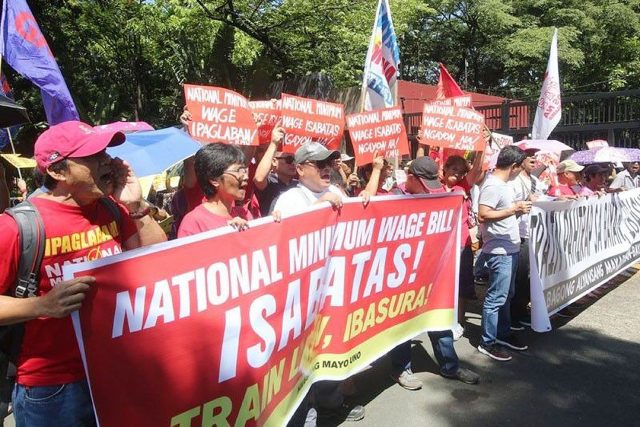Regional wage increases inadequate — labor groups

PAY HIKES imposed by regional wage boards are welcome but inadequate in addressing income disparities, labor coalitions said.
The Department of Labor and Employment (DoLE) reported that 15 out of the 16 Regional Tripartite Wages and Productivity Boards (RTWPBs) issued new wage orders this year, ensuring salary hikes for minimum wage earners. For organized labor, however, these regional orders are insufficient.
In its year-end briefing this week, the Federation of Free Workers (FFW) called for a review of the regional wage board system of adjusting wages, proposing instead a national body.
“It is necessary to review the mechanism of RTWPBs. One of our proposals is to create a national tripartite wages and productivity board.” FFW President Jose G. Matula said.
“These wage increases… we consider to be a victory for the workers. And yet these wages are not enough to support a family,” he added.
In a separate statement this week, Partido Manggagawa (PM) said that the regional wage hikes are insufficient to offset inflation. “The difference between nominal and real wages is a result of inflation over the years: wage hikes have not kept up with the rise in prices and so workers’ purchasing power has been depleted.”
“The wage orders from the various regional wage boards have fallen short of the wage recovery demand,” PM added.
According to Mr. Matula, the regional wage boards failed to boost productivity and attract investment in the provinces with workers continuing to flock to Metro Manila for higher pay.
Apart from a national wage board, both labor groups are lobbying for a legislated P150 national wage increase for workers in all sectors, measures which are pending in Congress.
“We are still pursuing the P150 across-the-board nationwide wage hike proposal, now pending in both houses [of Congress]. We hope that by early next year, it will be passed into law,” Mr. Matula said.
He added that the P150 wage hike proposal is doable, citing the economy’s improving performance. He expressed doubts whether such an increase will result in the displacement of workers.
FFW said it welcomes DoLE’s decision to join the International Labor Organization’s Global Coalition for Social Justice, which it said commits the department to ensure fair compensation and labor protection.
In a statement, DoLE said: “With its participation, the Philippines will be joined by other governments, workers’ and employers’ organizations, international and regional organizations, non-governmental organizations, and the academe in pushing for better labor and employment conditions.” — Jomel R. Paguian



